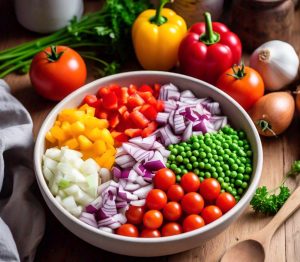Vegetables are a type of plant food that is consumed by humans and many animals for their nutritional value, including vitamins, minerals, fiber and more.
The question we aim to answer in this article is whether or not you can microwave these vegetables.
This article will delve into the specifics about microwaving vegetables: if it’s possible, how long they should be microwaved for, and whether or not the heating process destroys any nutrients or alters flavor. Additionally, if microwaving isn’t recommended for certain types of vegetables, we’ll provide alternatives along with tips and precautions to consider. We’ll also share frequently asked questions on this topic as well as our final thoughts.

Jump To:
Is It Possible to Microwave Vegetables?
Yes, you can certainly microwave vegetables. Microwaving is a quick and convenient method of cooking veggies while preserving their nutritional value. However, the time taken would vary depending on the type and quantity of vegetables being cooked. Just like other methods of cooking, microwaving can cause changes in the texture and taste of vegetables, either enhancing or diminishing these attributes.
Check out if you can cook cauliflower in the microwave.
Facts About Microwaving Vegetables
Here, we will discuss the important things to note about microwaving vegetables.
- Nutrients: Microwaving can cause a slight reduction in vitamin C and B vitamins, but is generally considered a good method for preserving nutrients in vegetables because it involves shorter cooking times.
- Cooking Time: Vegetables can be microwaved quickly, typically taking anywhere from 3-7 minutes depending on the vegetable type and microwave power level.
- Texture: Microwaving retains the texture of most vegetables as there’s limited water involved which usually leads to sogginess when overcooked.
- Taste: The flavor of some vegetables may intensify with microwaving due to the fast evaporation of water content within them.
- Safety: Microwave-safe containers should always be used when microwaving any food including vegetables due to the potential risk of chemicals leaching into your food if inappropriate materials are used. Plastic wrap should not touch your foods during heating.
In conclusion, while there are several considerations one must take into account while microwaving veggies, it remains a quick and useful method for preparing healthy meals.
Now we will discuss some other things about microwaving vegetables.
How Long Can You Microwave Vegetables?
The optimal time for microwaving vegetables will vary according to the type of vegetable and its volume. Generally, most vegetables need between 3 to 8 minutes in the microwave. For instance, broccoli or cauliflower florets would require approximately 4-5 minutes while spinach may only need up to 2 minutes. It’s crucial to observe your veggies as they cook since overcooking could lead to them becoming mushy.
Does Heating Vegetables in a Microwave Destroy Their Nutrients?
Microwaving vegetables does not necessarily destroy their nutrients. In fact, it might even preserve them better than other cooking methods like boiling due to reduced cooking times and lesser water usage which diminishes nutrient leaching. However, some heat-sensitive nutrients like vitamin C might be slightly diminished during microwaving but this is common with any kind of heat treatment.
Check out if you can microwave lettuce.
Does Heating Vegetables in a Microwave Affect Their Flavors?
Heating vegetables in a microwave generally doesn’t adversely affect their flavor if cooked correctly. Microwaves efficiently retain the fresh flavor of the veggies by sealing in natural juices and aromas that potentially get lost through traditional stove-top cooking methods involving water. Nevertheless, each vegetable has unique attributes; hence, taste differences could exist based on individual palates.
In conclusion, we have discussed how long you can microwave different types of vegetables without compromising their nutritional content or flavor profiles as well as given tips for achieving optimum results from your trusty kitchen appliance – the microwave!

Frequently Asked Questions (FAQs)
We will now look at the most commonly asked questions related to microwaving vegetables.
Can you microwave vegetables?
Yes, you can microwave vegetables. Microwaving is a quick and convenient way of cooking vegetables while retaining their nutrients. The key is not to overcook them as they can become soft and lose some nutritional value. Use a microwave-safe dish, add a small amount of water, cover it, and cook on high for 1-4 minutes depending on the type of vegetable.
Does microwaving vegetables destroy nutrients?
No, microwaving does not necessarily destroy nutrients in vegetables. All forms of cooking can break down some nutrients, but since microwaving often involves shorter cooking times and less heat than other methods like boiling or baking, it generally preserves more nutrient content.
How long should you microwave frozen vegetables?
You should microwave frozen vegetables for approximately 5-7 minutes for efficient heating. However, this depends on the watts of your microwave oven; lower wattage may require a longer duration whereas higher wattage might need less time.
Is it safe to reheat cooked vegetables in the microwave?
Yes, it’s safe to reheat cooked vegetables in the microwave provided they were properly stored after first being cooked. Store leftover veggies in an air-tight container within two hours from when they were initially prepared before reheating them again.
Check out if you can microwave cabbage.
This concludes our frequently asked questions section about microwaving vegetables.
Final Word
Microwaving is one of the fastest ways to cook or heat up food including various types of veggies. It helps retain vital nutrients that might otherwise get lost in other cooking processes. Just ensure to use microwave-safe containers and avoid overheating veggies to maintain their texture and nutrient content.



